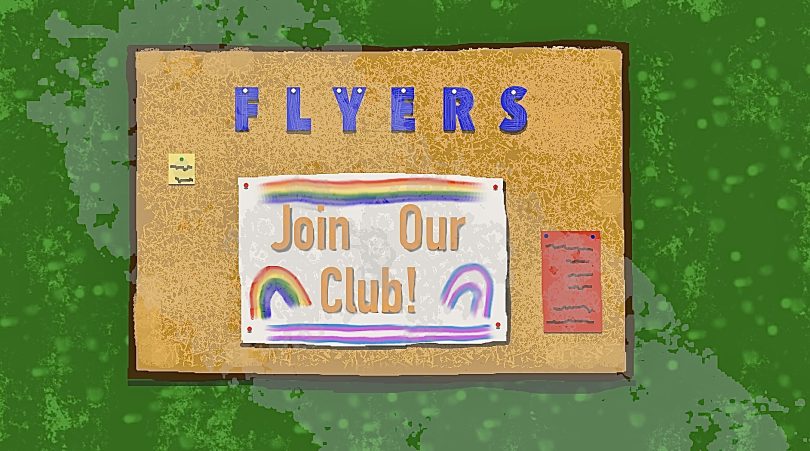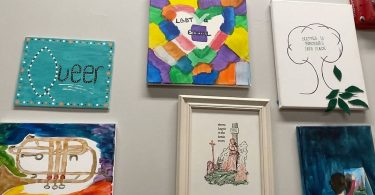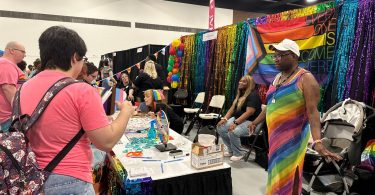Amid what they call “direct attacks” from the North Carolina legislature against LGBTQ+ students, Brennan Lewis recalled how one club at their former Wake County high school helped them in a special way.
The club was a Gay Straight Alliance (GSA), more commonly known now as Gender and Sexualities Alliances.
“The Gay Straight Alliance was a big part of my coming out experience and sort of how I situated myself at school and within my community and meeting other LGBTQ people for the first time,” Lewis said.
Lewis now serves as the education policy associate for Equality NC, a foundation that works to promote equity and justice for LGBTQ+ people in the state.
GSAs and other similar LGBTQ+ student organizations provide spaces for LGBTQ+ students and their allies to gather, build a sense of community, organize activities, and more, Lewis said.
“(A GSA) provides a space where trusted relationships can be built for students, preventing this gap of not only educational resources, but also mental health resources that we see a lot in queer youth because it’s so important to be supportive, and many of our students do not have the same access to mental health resources,” said Jazmynne Cruz, communications director for Equality NC.
Lewis said some GSAs incorporate activism into their organization, working to impact policy and their community.
Lewis and Cruz said school clubs like GSAs provide a safe space at schools for LGBTQ+ students to make friends with one another and have the opportunity to ask questions relating to their gender and sexuality.
Lately, Lewis said, many students have told Equality NC that they feel unsafe and unwelcome in school due to recent legislation, including Senate Bill 49, known as “The Parents’ Bill of Rights.”
“We’re definitely hearing from students that are scared or frustrated about the way that the new policies have been impacting them,” Lewis said. “And I think we’re really in a moment where it’s sort of a challenging space for all students in K through 12 schools in North Carolina as far as mental health and still handling the lasting impacts of the pandemic and what that did to learning.”
SB 49, which passed last year, requires school personnel to disclose to parents if students tell a staff member that they wish to change their name or pronouns. Equality NC said in a statement that this legislation could out students and end up “putting them at risk of abuse or neglect.”
In a 2023 national survey of LGBTQ+ young people, the Trevor Project, a suicide prevention nonprofit for LGBTQ+ youth, found that only 38% of young LGBTQ+ people found their home to be affirming of queer identities, and 41% seriously considered attempting suicide in the past year.
“I think that’s the No. 1 scariest piece to a lot of students who are transgender or who are experimenting with using a different name or pronouns at school and with friends — feeling like school is no longer that space where they get the opportunity to express themselves,” Lewis said.
Supporters of the bill say it will increase transparency for parents about the wellness of their children and the information students are being taught.
In a Senate release last year, one of the bill’s sponsors, Sen. Amy Galey (R-Alamance), said the bill “increases accessibility to what’s being taught in our schools, notifies parents of the well-being of their children, and keeps school curriculum focused on core subjects.”
In addition to the parental disclosure provision, the law bars any instruction on gender or sexuality in kindergarten through fourth grade.
“That really sends a message to students that they’re not welcome, not supported in their identities,” Lewis said.
On Jan. 30, the Campaign for Southern Equality filed a complaint attesting that SB 49 and HB 574 (which bans transgender athletes from participating on the sports team that most closely aligns with their gender) violate Title IX, a civil rights law that prohibits sex-based discrimination in educational institutions that receive federal funding.
The complaint includes testimonials from parents, students, and educators, with some referencing how the legislation has affected their schools’ GSA.
“This bill will negatively affect myself and so many of my friends. It stops us from speaking in places where we should feel safe, it means that when we talk about our identities our GSA teacher leader has to step out of the room so that they have plausible deniability,” an anonymous student shared.
Another anonymous student testified that administrators have made their school’s GSA no longer feel like a safe place in the wake of the legislation.
Rebecca Narcizo, a recent high school graduate and former president of their school’s GSA, said that after SB 49, GSAs are even more important and allow students to share feelings about the legislation, express themselves, and connect face-to-face with other students.
“GSAs probably are at risk for being shut down or something because they think you’re doing something bad or indoctrinating kids or something, but they just don’t realize that obviously it’s really the community and just people trying to get together to not only support each other but support the community as a whole,” Narcizo said.
The Trevor Project’s 2023 survey found that transgender and non-binary students who feel their schools are LGBTQ-affirming report lower rates of attempted suicide. Part of what makes a school LGBTQ-affirming is that it will “encourage LGBTQ student organizations and clubs,” the Trevor Project said.
The N.C. Senate voted on HB 755, a “Parents’ Bill of Rights,” on June 1, 2022, the first day of Pride Month. Anna Pogarcic/EducationNC
Outside of the public school setting, where SB 49 doesn’t apply, LGBTQ+ youth can also find community and safe spaces in their areas or online.
For example, Lewis said Equality NC has launched a Youth Network for young people ages 16 to 26. It functions as a virtual space for youth across the state to gather and relate to their peers.
“I think that it fills some of the need for a GSA or community organization for students, especially in rural parts of North Carolina who might not have access to the same resources as someone in Durham or Asheville,” Lewis said.
Equality NC: provides a number of services including educational opportunities, youth fellowship opportunities, support for homeless LGBTQ+ youth, events, and programming
The Trevor Project: national suicide prevention and crisis intervention organization for LGBTQ+ youth
Time Out Youth: a Charlotte-based organization providing events, programs, and services to LGBTQ+ youth ages 13-24
Youth OUTright: an organization in Western North Carolina offering programming for youth ages 11-24, training, and queer advocacy
LGBT Center of Raleigh: provides programming and leadership opportunities for youth, families
LGBTQ Center of Durham: provides youth programming and space to gather for young people
National Runaway Safeline: confidential crisis hotline and online resource for youth who are homeless, have run away from home, or are considering running away from home
This page from GLSEN provides educators access to resources for supporting LGBTQ+ students
Equality NC: provides education, guidance, and professional development for school officials interested in creating an inclusive school environment
Learn how to start a GSA at your school here







